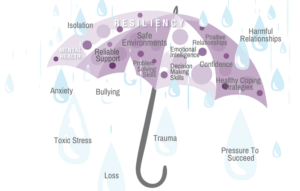Menu
Close
What Is Resiliency?
Apr 14, 2021
We hear the word “resilient” being used a lot, especially when talking about recent events. But what does it actually mean?
What Is Resiliency?
Resilience is the ability to recover from difficult times.

Being resilient means overcoming tough situations such as losing a pet or failing a test. Dealing with sources of stress including family, relationships, school, and health can also test resiliency.
Dr. Michael Ungar, Founder and Director of the Resilience Research Centre at Dalhousie University, says resilience is about navigating what we need to take on the obstacles that are in our way.
Ungar uses the fairytale story of Cinderella to get across the idea that any person, despite their intrinsic and individual qualities, needs support.¹
“What I really think about is—can we focus a little bit more in terms of who our fairy godmothers or fairy godfathers [are] and where are the resources we need to bring out our best selves so that we can shine.”
With the support of her fairy godmother, Cinderella was able to prosper and have her happy ending. Ungar believes everyone can achieve this result by finding their resilience.
Finding Resilience
As we continue to approach each day with hopes of normalcy, it’s good practice to engage in different strategies that will help improve resilience.
Ungar explains how simple things, such as maintaining a routine, have been shown to lower levels of stress.
“Finding substitute routines will trigger the sense of predictability in our lives,” Ungar said.
For youth this can mean waking up for school at a set time, eating a balanced breakfast, playing outside, eating dinner with the family, limiting screen time at night, etc.
Taking a few minutes each day to show gratitude for the things that actually went well, without dwelling on all the negativity that still may be hovering around, is also another way to boost positivity and optimism.
Other ways to find resilience in your life include:
- Contributing to others (donate items, volunteer online)
- Reaching out for connection (family member, friend, peer support)
- Connecting with yourself (meditation, self-evaluation)
- Setting attainable goals (short-term, long-term)
- Training your brain (disrupting negative self-talk)
Setting these tasks into motion may seem minimal, but can actually gear your mind to focus on larger goals in your life or even step back from the news and current events happening around us.
Building Resilience
Resilience is not a trait that people either have or do not have. It is built through the combination of supportive relationships, adaptive skill-building, and positive experiences.
Like building a muscle, building your resilience takes time and effort.
There are many different protective factors that families and youth themselves can work on to overcome future challenges.
Emotions
Families that warmly and openly express how they feel can introduce younger people in the family to learn how to identify and respond to other people’s feelings, as well as their own. Healthily managing these emotions builds emotional wellness and intelligence.
Adaptability
Teaching youth how to make decisions and solve problems in different learning environments will result in independence and perseverance in the future. Allowing them to think on their own and evidently make mistakes is how they will learn to adapt to tough situations when they come.
Inclusivity
Social communities embrace and accept people for who they are. To have that sense of belonging, find what social activities make you feel happy, safe and included. This is where some people find their tribe—a group of people, or community, with similar interests and values. Maintaining these positive relationships with those outside your family can help you develop cognitive thinking skills.
Confidence
You need to believe that things will get better, even if in the current moment it looks like it never will. Whether it’s through positive self-talk, a trusted adult, or anything that makes you empowered to take the next step, you need to be aware that there is always a way to get through a difficult situation. Asking for help is a sign of strength—not weakness.
Resiliency Umbrella

There are a variety of factors within the mental health continuum that increase or decrease mental well-being. The factors that increase our well-being are called “protective factors” (dots on the umbrella). Those that decrease mental well-being are called “risk factors” (raindrops).
All of these protective factors are used to increase mental well-being while risk factors, such as trauma, decrease mental well-being. The more protective factors that we have in our life, the stronger our resiliency, and the fewer risk factors affect our mental health. For more details on the risk factors, please visit our webpage.
It’s important to note that there will always be challenges, but it is how you react to those setbacks that will make you a more resilient person.
¹“How to build your mental resilience for difficult times,” The Globe and Mail, published on October 26, 2020, The Globe and Mail video, 0:17, https://www.theglobeandmail.com/life/video-how-to-build-your-mental-resilience-for-difficult-times/.
²“How to build your mental resilience for difficult times,” The Globe and Mail, published on October 26, 2020, The Globe and Mail video, 2:02, https://www.theglobeandmail.com/life/video-how-to-build-your-mental-resilience-for-difficult-times/.
³Centre for Addiction and Mental Health, “Raising Resilient Children and Youth,” Centre for Addiction and Mental Health, https://www.camh.ca/en/health-info/guides-and-publications/raising-resilient-children.

If you cannot find someone you trust who is willing to support you, dial a crisis line right away at 403-266-HELP (4357) All crisis lines are confidential.

YouthSMART would like to thank Sagium and Kinsted Wealth for being our 2020 – 2021 website sponsor.
